Last Updated on March 21, 2024
In the ever-evolving world of technology, smart home devices have become a cornerstone of modern living. As we step into 2024, the sophistication and variety of these gadgets have reached new heights, offering unprecedented convenience, efficiency, and security. From voice-activated assistants that control your entire home to lighting systems that adjust with the rhythm of your day, the latest innovations are designed to make your life simpler and more enjoyable. This guide explores the best smart home devices of 2024, helping you navigate through the plethora of options to find those that best suit your lifestyle and needs. Whether you’re looking to upgrade your existing setup or taking your first step into the world of smart technology, this article will provide you with all the information you need to make informed decisions.
Why Upgrade to Smart Home Devices?
In today’s fast-paced world, the allure of smart home devices extends beyond mere convenience. These innovative technologies offer a multitude of benefits that can significantly enhance the quality of life, making them a worthwhile investment for any homeowner. Here’s why upgrading to smart home devices is more than just a trend—it’s a smart move towards a more efficient and secure home.
1. Convenience at Your Fingertips: Imagine adjusting the temperature, dimming the lights, or checking your front door camera from anywhere in your home—or even remotely. Smart home devices are engineered to provide unparalleled convenience, allowing you to control various aspects of your home environment with just a voice command or a tap on your smartphone.
2. Energy Efficiency and Cost Savings: Smart thermostats and lighting systems can learn your habits and adjust themselves accordingly, ensuring that energy is not wasted. By optimizing energy usage, these devices can significantly reduce your utility bills, making them an eco-friendly and cost-effective choice.
3. Enhanced Security: With smart locks, security cameras, and alarm systems, you can monitor and protect your home with ease. These devices offer real-time alerts and video footage, giving you peace of mind whether you’re at home or away.
4. Personalized Experience: Smart home devices can be customized to suit your lifestyle. Whether it’s creating the perfect ambiance with smart lighting or having your coffee ready when you wake up, these devices learn from your preferences to provide a tailored experience.
5. Future-Proofing Your Home: Integrating smart devices not only provides immediate benefits but also adds value to your home. As technology advances, having a home that is equipped with the latest smart devices will keep you ahead of the curve.
Upgrading to smart home devices is an investment in comfort, security, and efficiency. As we delve into the specifics of the best smart home devices of 2024, consider how these advancements can transform your living space into a more connected and convenient home.
Smart Speakers & Displays: Enhancing Your Home’s Intelligence
Smart speakers and displays have become the cornerstone of modern smart homes, providing not only entertainment but also a central command center for managing other smart devices. The year 2024 brings us cutting-edge advancements in this technology, designed to blend seamlessly into our lives. Here’s a closer look at the leaders in this space.
Echo Show 10 (3rd Gen) | HD Smart Display
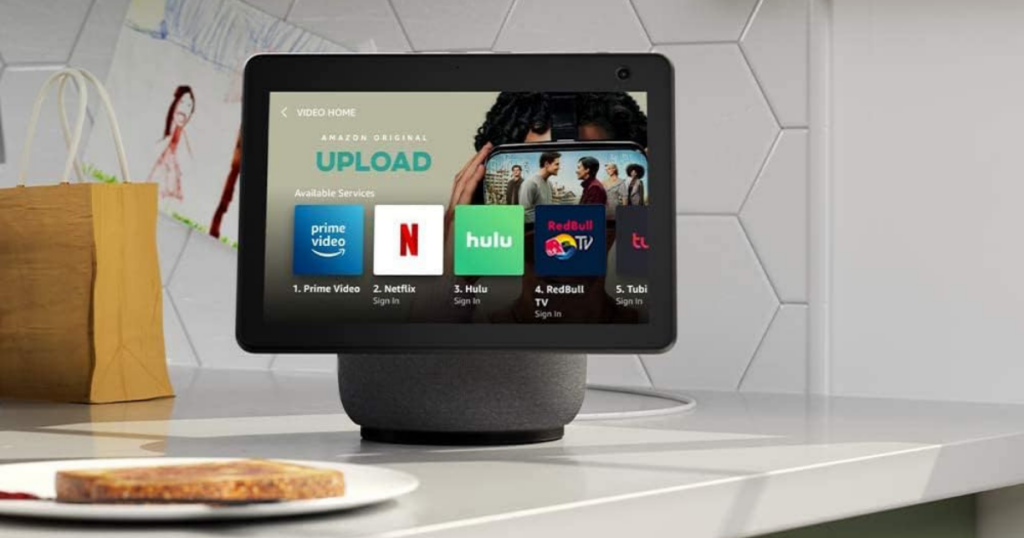
(Image Credit: Echo Show)
Design and Display: The Echo Show 10 (3rd Gen) stands out with its revolutionary design, featuring a 10.1-inch HD screen mounted on a motorized base that intelligently follows you around the room. This means you’re always in frame during video calls and can watch content or follow recipes without needing to adjust the device manually. The device’s sleek, modern aesthetic fits seamlessly into any room, making it not just a smart device but also a piece of decor.
Functionality: Beyond its impressive design, the Echo Show 10 serves as a powerful smart home hub. With Alexa built-in, it responds to voice commands, allowing you to control smart home devices, play music, set reminders, and more. Its Zigbee hub integration means it can easily connect to and control compatible smart home devices without the need for separate hubs.
Security Features: The Echo Show 10 also doubles as a security camera. With its built-in camera, you can securely access a live feed of your room from your smartphone, no matter where you are. This feature, combined with Alexa Guard, can help monitor your home for unusual sounds like glass breaking or alarms, adding an extra layer of security.
Privacy: Amazon has placed a strong emphasis on privacy, with multiple layers of privacy controls including a microphone/camera off button and a built-in camera shutter. This allows users to take control of their privacy at any moment.
Echo Dot (5th Gen, 2022 release)
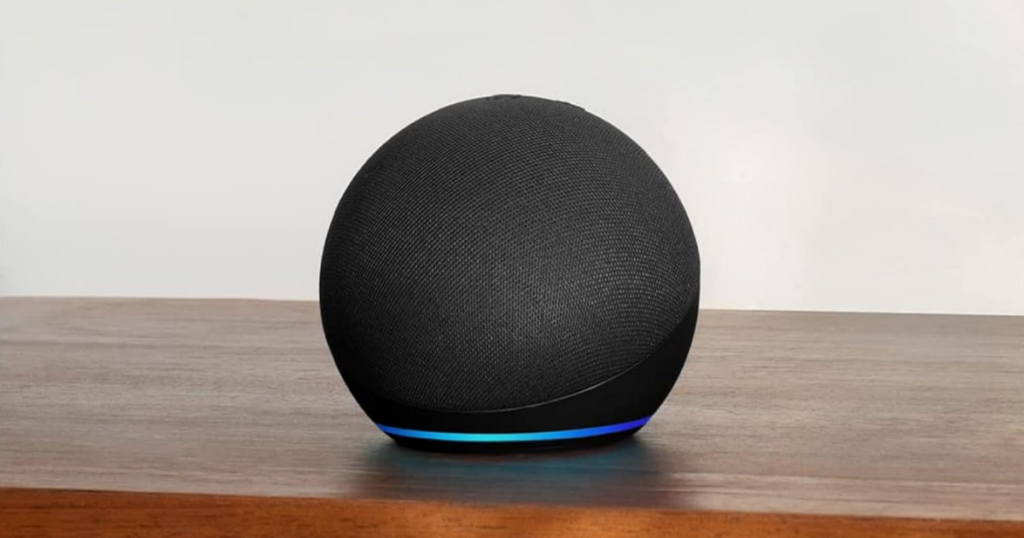
(Image Credit: Echo Dot)
Sound Quality: The Echo Dot (5th Gen) has been redesigned to deliver clearer vocals, deeper bass, and overall richer sound in a compact form. It’s perfect for listening to music, audiobooks, or podcasts in any room, providing a sound experience that belies its size.
Versatility: This small device is incredibly versatile, capable of acting as an independent smart speaker or integrating into a larger Echo ecosystem within your home. It can control smart home devices, assist with daily tasks, and even play games, making it a multipurpose tool for any room.
Ease of Use: Setting up and using the Echo Dot is incredibly straightforward, with voice commands making interaction natural and intuitive. Its compact size and minimalist design mean it can fit almost anywhere, providing smart capabilities without taking up much space.
Privacy and Security: Like the Echo Show 10, the Echo Dot is built with privacy in mind. It includes the same privacy features, such as the microphone off button, ensuring that users have control over when they want to be listened to.
Google Nest Hub 7” Smart Display with Google Assistant
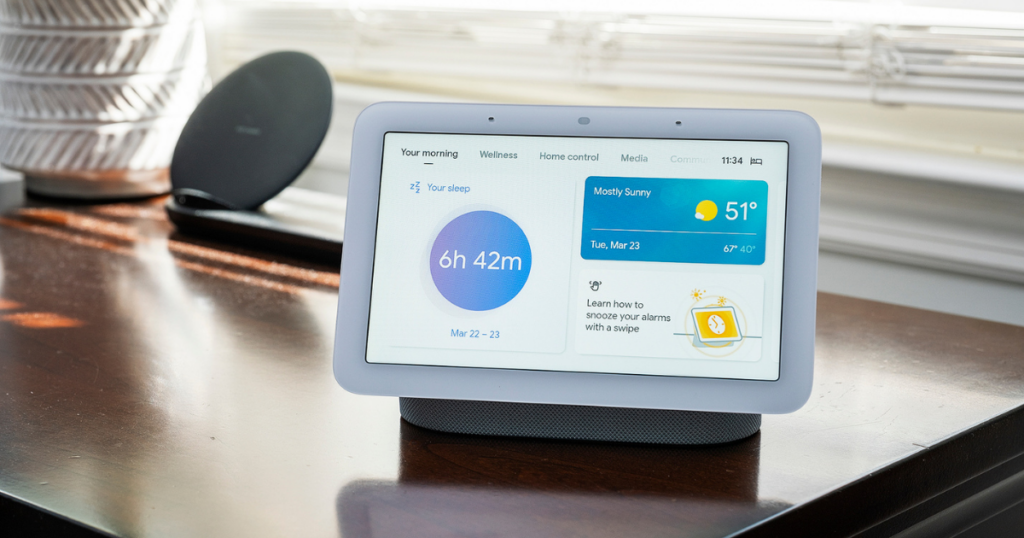
(Image Credit: Google Nest)
Interactive Display: The Google Nest Hub features a 7-inch color touchscreen that provides visual feedback for all your queries and commands. Whether you’re looking for weather updates, news, or just wanting to watch YouTube videos, the display adds a layer of interaction that enhances the smart speaker experience.
Smart Home Control: With Google Assistant built-in, the Nest Hub becomes a central point of control for all your smart home devices. Adjust lights, control thermostats, or view security cameras—all with simple voice commands or a few taps on the screen.
Sleep Sensing: A unique feature of the Nest Hub is its ability to help monitor your sleep when placed on a bedside table. Using Motion Sense technology, it can track your sleep patterns without the need for wearable technology, providing insights and recommendations for improving your sleep quality.
Privacy: Google has also prioritized user privacy, with no camera on the device and a microphone mute switch to physically disconnect the microphones.
Illuminate Your Space with Smart Lighting
The right lighting can dramatically alter the mood, aesthetics, and functionality of our living spaces. With the advent of smart lighting technology, control and customization have reached new heights. In 2024, these devices are not just about illumination; they’re about personalizing your environment to match your lifestyle. Let’s take a closer look at some of the leading smart lighting options.
Philips Hue Premium Smart Bulbs, 16 Million Colors

(Image Credit:Philips)
Vast Color Spectrum: The Philips Hue Premium Smart Bulbs stand out by offering an incredible range of over 16 million colors. This extensive palette allows users to fine-tune their room’s ambiance with precision, from warm, soothing tones to vibrant colors for party settings.
Scene Setting and Synchronization: These smart bulbs excel in creating scenes that can match any mood or occasion. Whether it’s mimicking the colors of a sunset to relax in the evening or syncing with your favorite music for a dynamic light show, the bulbs adapt to your needs. The Philips Hue app even lets users capture colors from their photos to replicate in their lighting, making memorable moments last.
Integration and Connectivity: Seamlessly integrating with most smart home ecosystems, these bulbs can be controlled via voice commands through Alexa, Google Assistant, or Siri. The setup promotes a hands-free operation that’s perfect for when your hands are full or you’re just comfortably settled on the couch.
Energy Efficiency and Longevity: Designed for durability and efficiency, these LED bulbs not only lower energy consumption but also have a long lifespan, reducing the need for frequent replacements. This makes them an environmentally friendly and cost-effective lighting solution for modern homes.
LIFX Lightstrip Color Zones, Wi-Fi Smart LED Light Strip

(Image Credit: LIFX)
Adaptive Design: The LIFX Lightstrip is all about flexibility. Its ability to be cut to size and extended up to 10 meters with additional strips makes it perfect for custom installations. The self-adhesive back allows for easy placement along any surface, enhancing spaces with beautiful accent lighting.
Independent Color Zones: What sets the LIFX Lightstrip apart are its independently controlled color zones. Each section of the strip can display different colors and brightness levels simultaneously, offering unparalleled customization for creating complex, layered lighting effects.
App-Controlled and No Hub Needed: With direct Wi-Fi connectivity, these light strips don’t require a separate hub, making setup a breeze. The LIFX app unlocks a spectrum of colors and dynamic themes, from gentle fades to energetic pulses, all controllable from your smartphone.
Philips Hue Smart Slim 5/6 Inch LED Downlight
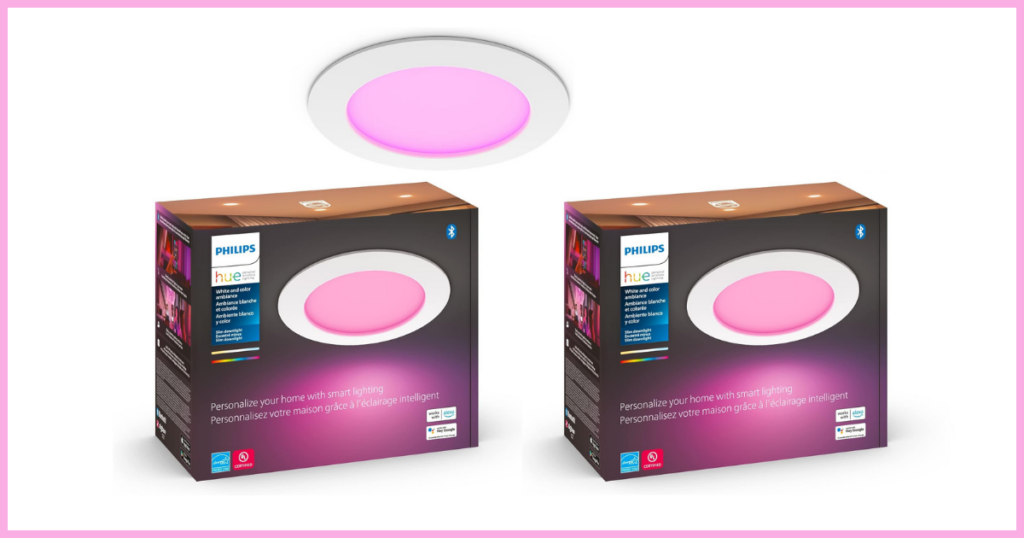
(Image Credit: Phillips)
Elegant and Efficient Lighting: The Philips Hue Smart Slim LED Downlight is designed for modern homes, offering a minimalist aesthetic without compromising on brightness. Its high lumen output ensures that spaces are well-lit, while the option to adjust color temperature from cool to warm white aids in setting the perfect tone for any activity.
Easy Installation and Compatibility: Ideal for new installations or upgrading existing downlights, these slim LEDs fit into a variety of spaces. Compatibility with the Philips Hue ecosystem means they can be incorporated into scenes and routines already set up in your home, enhancing the cohesive feel of your smart lighting.
Advanced Features: Beyond basic lighting, these downlights support advanced features like wake-up and go-to-sleep routines, mimicking natural sunlight to help regulate your circadian rhythm. Their integration with security systems can also simulate presence, deterring unwanted visitors when you’re away.
Optimizing Comfort with Smart Thermostats
Smart thermostats are more than just a convenient way to control your home’s temperature; they are intelligent systems designed to learn from your habits, optimize energy usage, and enhance the overall comfort of your living space. With advancements in technology, the smart thermostats of 2024 stand out for their intuitive interfaces, energy-saving features, and seamless integration with other smart home devices. Let’s delve into some of the top smart thermostat models that are redefining home climate control.
Google Nest Learning Thermostat
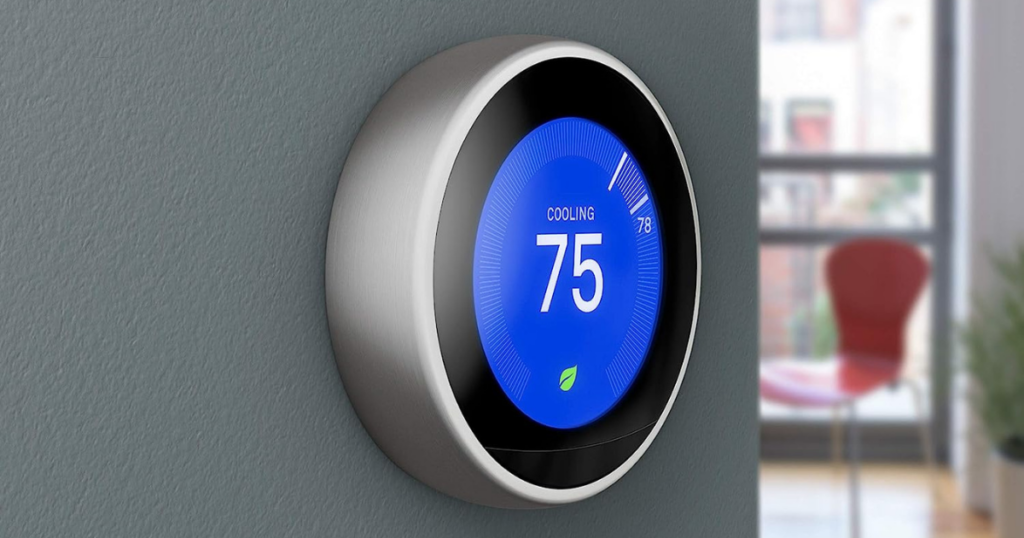
(Image Credit: Google Nest)
Self-Learning Capabilities: The Google Nest Learning Thermostat goes beyond manual programming to learn your schedule and temperature preferences, automatically adjusting to your habits for optimal comfort and efficiency. Over time, it understands when to turn down the heat or crank up the cooling, ensuring your home is always at the perfect temperature when you’re there and conserving energy when you’re not.
Energy Savings: This thermostat comes with a feature called the Nest Leaf, which appears when you choose a temperature setting that saves energy. It guides you towards energy-efficient temperatures, potentially saving you a significant amount on your energy bills. Moreover, the Energy History and Home Report features give you insights into your energy consumption, helping you understand and control your usage better.
Sleek Design and Display: With its high-resolution, color display and sleek, modern design, the Nest Learning Thermostat adds a touch of elegance to any room. The display shows the temperature, weather, or time, and it lights up when it detects you approaching, offering a seamless blend of form and function.
Remote Control and Compatibility: Equipped with Wi-Fi, it allows you to control the temperature from anywhere through the Nest app. Whether you’re in bed or away from home, adjusting your home’s climate is just a tap away. It’s also compatible with most HVAC systems and works with voice assistants like Google Assistant and Amazon Alexa, providing a central piece for your smart home ecosystem.
ecobee SmartThermostat with Voice Control
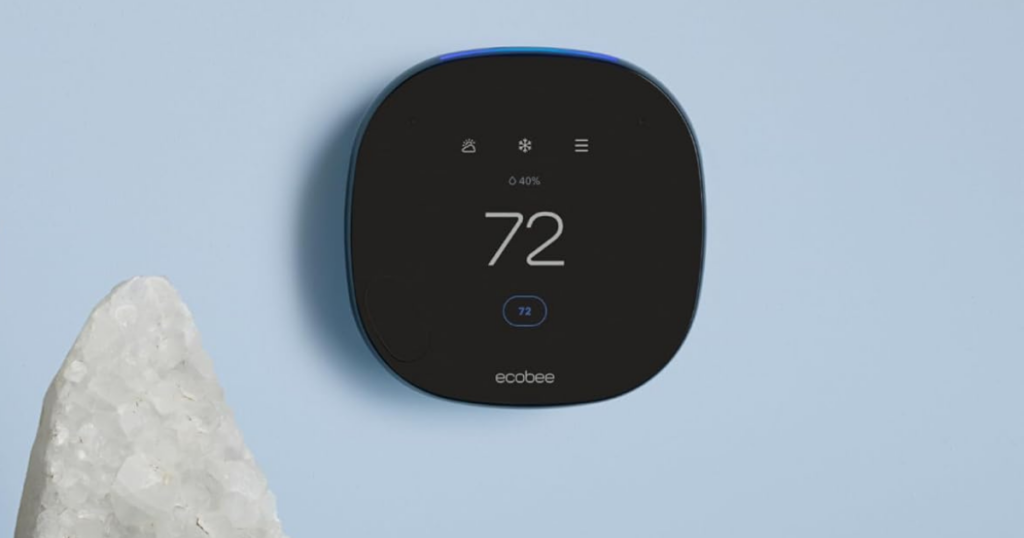
(Image Credit: Ecobee)
Advanced Voice Control: The ecobee SmartThermostat is distinguished by its built-in Alexa voice service, allowing you to control not only the thermostat but also other smart home devices, play music, make calls, and more, directly from the thermostat. This level of integration makes it a versatile hub for your smart home.
SmartSensor for Enhanced Comfort: It comes with a SmartSensor, which you can place in different rooms to monitor temperature and occupancy, ensuring even and comfortable heating or cooling throughout your home. The thermostat uses this data to adjust the environment based on which rooms are occupied, eliminating hot or cold spots.
Energy Savings: The ecobee offers insights into your heating and cooling trends and suggests ways to save more energy. Its eco+ feature learns your routine and recommends small adjustments to your heating and cooling schedule, further enhancing its energy-saving capabilities.
Integration and Accessibility: Fully integrated with Apple HomeKit, Google Assistant, Amazon Alexa, and other smart home ecosystems, the ecobee SmartThermostat ensures you can manage your home’s climate from any device. Its touch display and intuitive interface make it easy to use, even for those new to smart home technology.
SunTouch ConnectPlus Programmable, Smart Thermostat for Electric Floor Heating
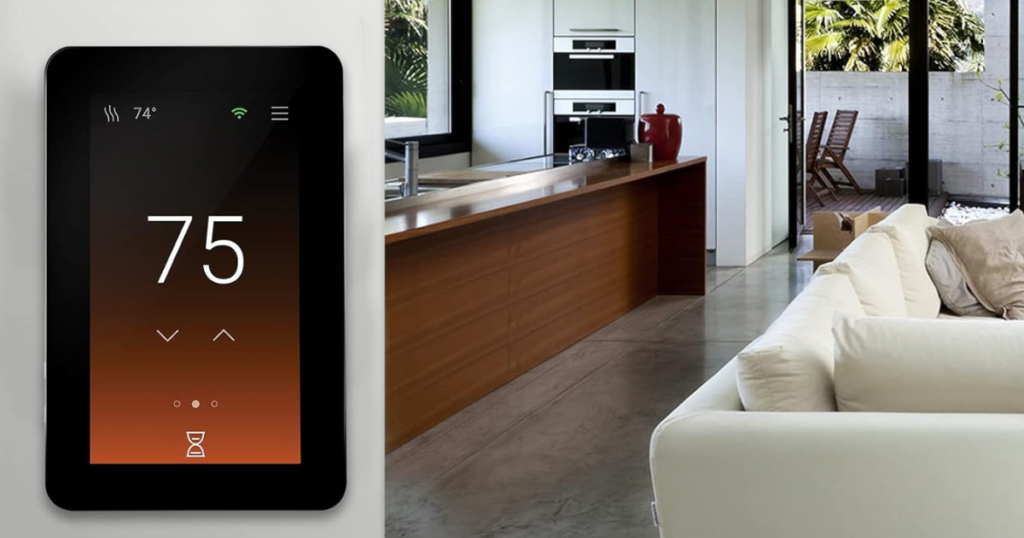
(Image Credit: SunTouch)
Designed for Electric Floor Heating: The SunTouch ConnectPlus stands out as a specialized option for those with electric floor heating systems. It offers precise temperature control for individual rooms, ensuring your floors are always at the perfect warmth, adding an extra layer of comfort to your home.
Programmable and Energy-Efficient: With programmable schedules, you can set your floor heating to turn on just before you wake up or arrive home, ensuring your space is always welcoming. Its energy monitoring features allow you to track usage and make adjustments to save on heating costs.
Wi-Fi Connectivity and Smart Home Integration: This thermostat can be controlled via an app, offering the convenience of adjusting your floor heating settings from anywhere. It also integrates with smart home systems, allowing for seamless operation alongside other devices in your home.
Securing Your Home with Smart Security Cameras
In 2024, smart security cameras have become essential components of home security, offering homeowners peace of mind through enhanced surveillance, innovative features, and seamless integration with smart home ecosystems. These devices not only deter potential intruders but also provide convenient monitoring capabilities, ensuring that your home is safe and secure. Let’s explore some of the leading smart security cameras that combine advanced technology with user-friendly interfaces.
Ring Video Doorbell – 1080p HD Video, Improved Motion Detection
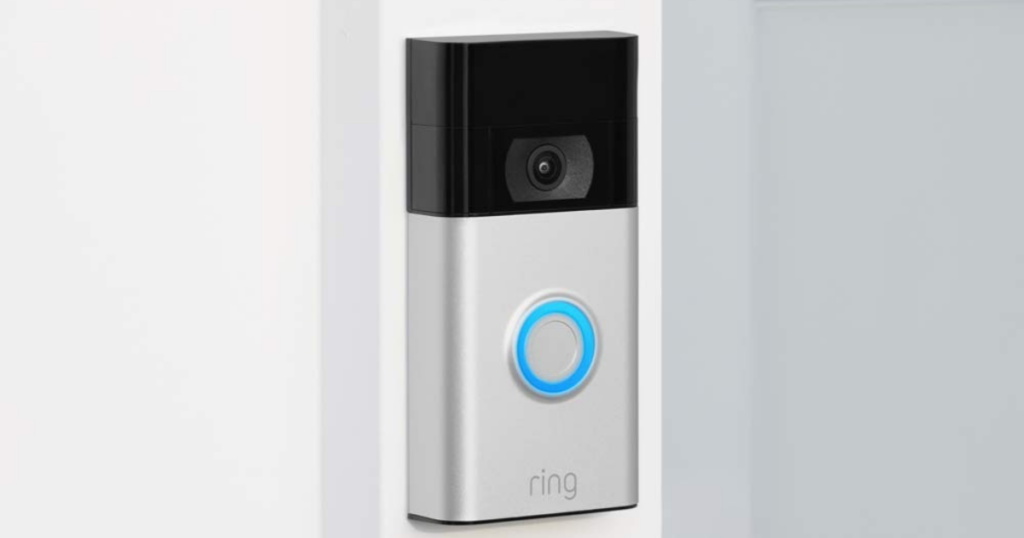
(Image Credit: Ring)
High-Definition Surveillance: The Ring Video Doorbell offers crisp 1080p HD video, ensuring you can clearly see who’s at your door or moving around your property. With night vision capabilities, this doorbell camera provides round-the-clock security, capturing clear footage even in low light conditions.
Advanced Motion Detection: Equipped with adjustable motion zones, the Ring Video Doorbell allows you to fine-tune the areas you want to monitor. This feature minimizes false alarms triggered by passing cars or animals, ensuring you’re alerted only when there’s actual activity of interest.
Two-Way Talk: The built-in microphone and speakers enable you to communicate directly with visitors without needing to open the door. Whether it’s a delivery person or an unexpected guest, you can easily converse with them from anywhere using your smartphone.
Seamless Integration: This smart doorbell seamlessly integrates with the Ring app and other Ring devices, creating a comprehensive home security system. It’s also compatible with Amazon Alexa, allowing for voice commands and the ability to view live video feeds on compatible Echo devices.
Arlo Pro 4 Spotlight Camera – Wireless Security
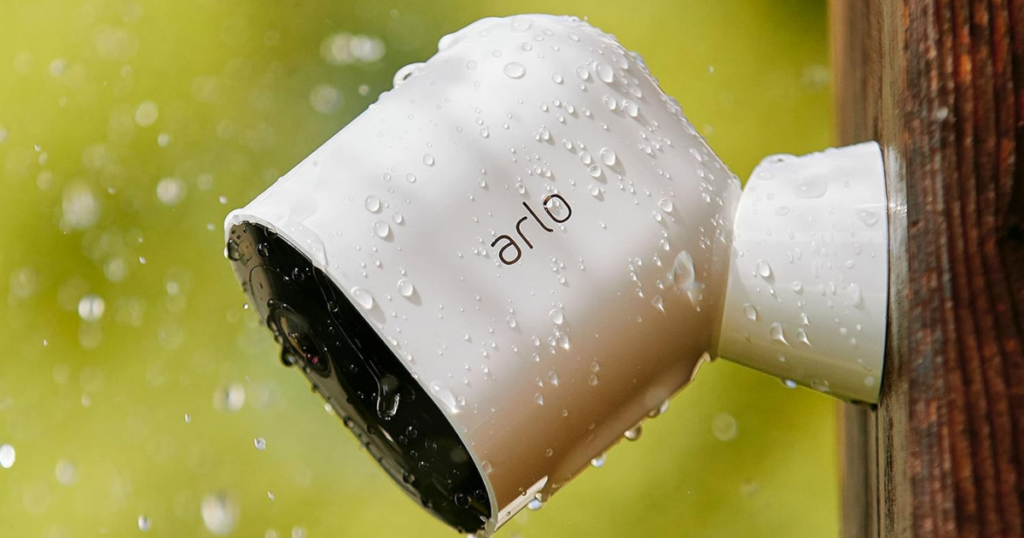
(Image Credit: Arlo)
Wireless Convenience: The Arlo Pro 4 Spotlight Camera offers the ultimate in installation flexibility, being completely wireless and easy to place anywhere around your property. Its rechargeable battery eliminates the need for power cables, making setup a breeze.
Spotlight and Color Night Vision: One standout feature is the integrated spotlight, which can illuminate the area when motion is detected, deterring intruders and capturing detailed color footage at night. This enhances the camera’s ability to identify subjects and increases security during the nighttime hours.
Direct Wi-Fi Connection: Unlike previous models, the Arlo Pro 4 connects directly to Wi-Fi without the need for a base station, simplifying the installation process and ensuring you can easily expand your security system as needed.
Smart Alerts and Detection: With advanced object detection, the Arlo Pro 4 can distinguish between people, vehicles, and animals, sending you only the notifications that matter. The camera also includes a siren that can be triggered remotely or automatically during an event, adding an extra layer of security.
Weather-Resistant Design: Designed to withstand the elements, the Arlo Pro 4 is weather-resistant, ensuring it functions optimally in rain, snow, heat, or cold. This durability makes it suitable for outdoor use in a variety of climates.
Keyless Entry with Advanced Smart Locks
As smart home technology continues to evolve, smart locks have become a pivotal feature in enhancing home security and convenience. The year 2024 showcases a variety of smart locks that not only secure your home but also integrate seamlessly with other smart devices, offering features such as remote access, voice control, and activity monitoring. Here’s a detailed look at some of the top smart locks on the market, designed to fit the modern homeowner’s needs.
August Home Smart Lock Pro + Connect Hub
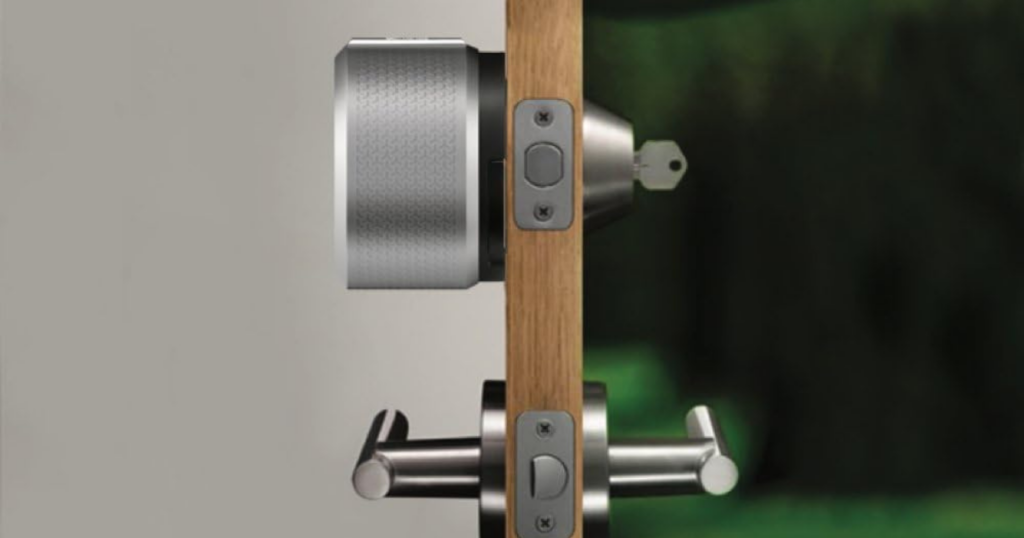
(Image Credit: August)
Seamless Integration and Versatility: The August Home Smart Lock Pro is renowned for its ability to integrate seamlessly with any standard deadbolt, allowing you to keep your existing keys. It offers easy installation and compatibility with various smart home systems, including Apple HomeKit, Google Assistant, and Amazon Alexa, enabling voice-activated control and real-time alerts.
Remote Access and Monitoring: With the included Connect Hub, you can control and monitor your door from anywhere, using the August app. This feature is perfect for letting in guests when you’re not home or checking if you remembered to lock the door. The DoorSense™ technology ensures you’re always aware of your door’s status, adding an extra layer of security.
Auto-Lock and Auto-Unlock: The smart lock detects when you arrive home and automatically unlocks the door for you, then locks it again once you’re inside. This hands-free operation enhances convenience, especially when carrying groceries or other items.
Activity Tracking: The August app provides a 24/7 activity feed, so you can track who comes and goes in real-time, offering peace of mind when you’re away from home.
Echo Show 10 (3rd Gen) | HD Smart Display
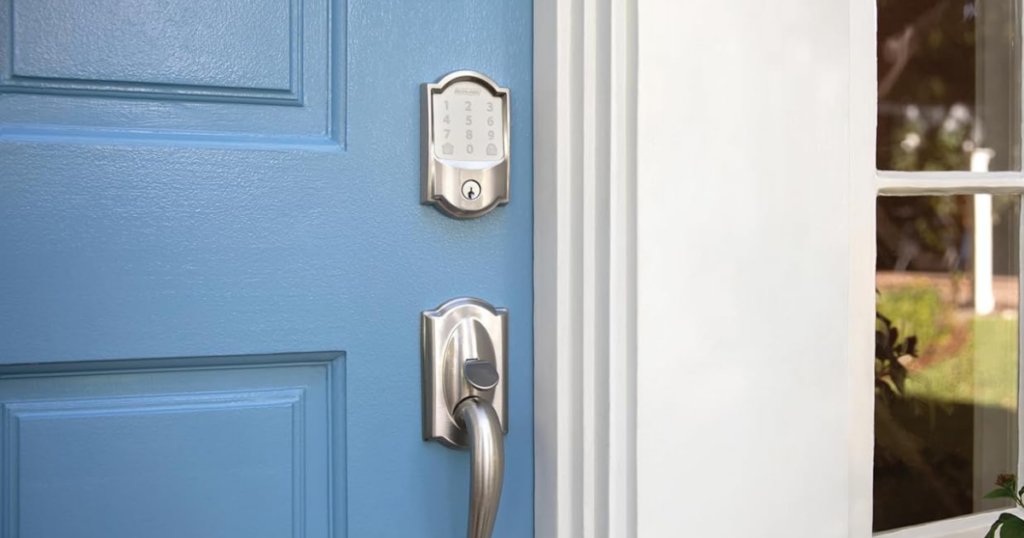
(Image Credit: Echo Show)
Wi-Fi Enabled for Easy Access: The Schlage Encode Smart Wi-Fi Deadbolt eliminates the need for additional hubs or accessories, connecting directly to your home Wi-Fi network. This allows for easy remote management of your lock via the Schlage Home app or key by Amazon app, enabling secure, keyless access control from anywhere.
Built-In Alarm Technology: This smart lock features built-in alarm technology that senses potential security breaches at the door, alerting you with an audible alarm. You can choose from activity, tamper, or forced entry alerts, providing comprehensive security for your home.
Voice Control and Flexibility: Compatible with Amazon Alexa and Google Assistant, the Schlage Encode allows for voice control, adding convenience to your daily routine. You can check the lock status, lock or unlock the door verbally, and even create up to 100 unique codes for friends, family, or guests.
Durable and Stylish Design: The Camelot trim offers a timeless look that complements any décor, while the deadbolt’s graded best in security, durability, and finish ensures long-lasting reliability and performance.
ULTRALOQ U-Bolt Pro Smart Lock
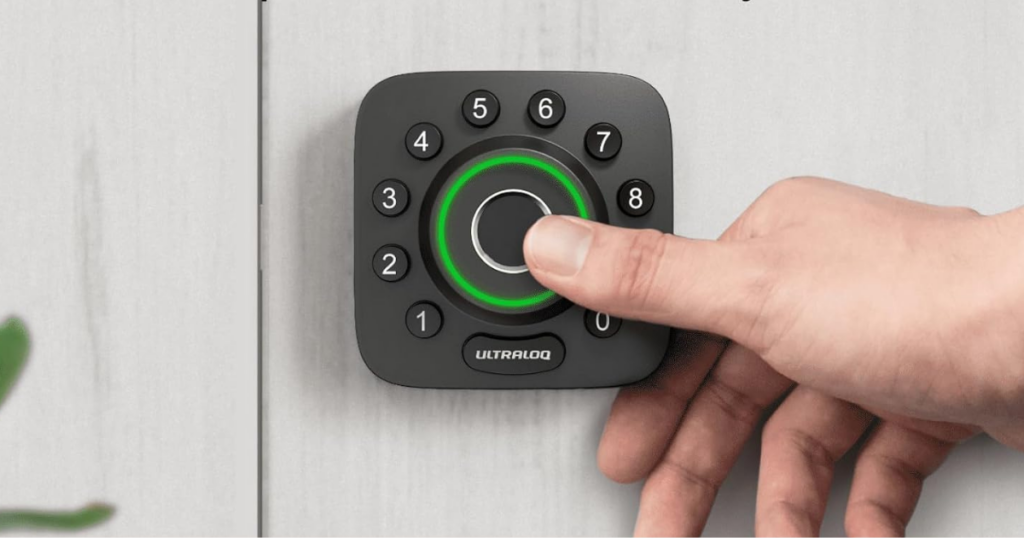
(Image Credit: ULTRALOQ)
6-in-1 Keyless Entry Options: The ULTRALOQ U-Bolt Pro stands out with its 6-in-1 keyless entry options, including fingerprint, anti-peep keypad, smartphone, auto-unlock, shake to open, and mechanical key. This variety ensures you always have a convenient and secure way to access your home.
Anti-Peep Keypad: The anti-peep keypad allows you to enter a security code embedded in a sequence of random numbers, preventing others from guessing your actual code by watching you or looking at the wear patterns.
Smartphone Control and Sharing: Through the ULTRALOQ app, you can manage entry access, see logs of who has entered, and clone users when you install a new lock. It’s perfect for rental property owners or anyone needing to grant temporary access to their home.
Robust and Weatherproof Design: Built to withstand extreme weather conditions, the U-Bolt Pro is durable and reliable, ensuring your home remains secure year-round.
Why Upgrade to Smart Home Devices?
Determine Your Needs and Goals
- Security: If enhancing home security is a priority, consider devices like smart locks and security cameras.
- Convenience: For those seeking convenience, smart speakers and displays, along with smart lighting, can automate daily tasks.
- Energy Efficiency: If reducing energy costs is your goal, smart thermostats and energy-efficient smart bulbs are ideal.
2. Consider Compatibility and Ecosystem
- Ecosystem Compatibility: Choose devices that are compatible with the same ecosystem (e.g., Amazon Alexa, Google Assistant, Apple HomeKit) for seamless integration.
- Interoperability: Look for devices that support open standards or have a wide range of compatibility with other smart home products.
3. Evaluate Installation Requirements
- DIY vs. Professional Installation: Some devices, like smart thermostats or locks, might require professional installation. Consider your comfort level with DIY projects.
- Wiring and Connectivity: Check if the devices need a wired connection or if they work over Wi-Fi or Bluetooth. Ensure your home’s infrastructure can support these requirements.
4. Prioritize Security and Privacy
- Data Encryption: Opt for devices that use encryption to protect your data and privacy.
- Regular Updates: Choose manufacturers that offer regular firmware updates to address security vulnerabilities.
- Privacy Controls: Look for devices with clear privacy controls, such as the ability to disable microphones or cameras.
5. Check for Energy Efficiency
- Energy Star Certification: Devices with Energy Star certification are designed to be energy-efficient, which can save you money in the long run.
- Power Options: Consider whether the device operates on batteries or needs to be plugged in, and evaluate the potential impact on your energy usage.
6. Read Reviews and Recommendations
- User Reviews: Check online reviews from other users to gauge reliability, ease of use, and performance.
- Expert Recommendations: Look for recommendations from trusted tech publications and compare features and prices.
7. Consider the Cost
- Initial Investment vs. Long-Term Savings: Some smart home devices may have a higher upfront cost but offer significant savings or benefits over time.
- Budget: Determine your budget and prioritize devices based on your most pressing needs.
8. Look for Future-Proof Features
- Expandability: Choose devices that can easily integrate with new products or technologies as your smart home evolves.
- Adaptive Learning: Devices with machine learning capabilities can adapt to your habits and preferences, providing enhanced functionality over time.
Investing in smart home technology can transform your living experience, offering a blend of comfort, security, and efficiency. By carefully considering your needs, compatibility, security, and budget, you can select the smart home devices that will best enhance your daily life. Remember, the goal is to build a cohesive, intelligent ecosystem that grows with you and your home’s changing needs.
Why Upgrade to Smart Home Devices?
As we delve into 2024, the landscape of smart home technology is rapidly evolving, driven by advancements in artificial intelligence, machine learning, and IoT connectivity. These innovations are not only making smart devices more intuitive and efficient but also transforming the way we interact with our living spaces. Here’s a look at the most exciting trends shaping the future of smart homes.
Enhanced AI and Machine Learning Integration
Artificial Intelligence (AI) and Machine Learning (ML) are at the forefront of making smart home devices more predictive and responsive to homeowner needs. Devices are increasingly capable of learning from user behavior to automate tasks. For instance, smart thermostats now predict your preferred temperature settings for different times of the day, while smart refrigerators can monitor your food stock and suggest shopping lists or recipes.
Voice Assistant Improvements
Voice assistants are becoming more sophisticated, moving beyond basic commands to hold more contextual and nuanced conversations. This evolution is making the interaction with smart devices smoother and more natural, thereby enhancing user experience. Future updates are expected to bring even more personalized interactions, understanding not just what is being said, but also the user’s intentions and emotions behind the commands.
Seamless Smart Home Integration
Interoperability between different brands and systems is a growing focus, with an aim to create a truly interconnected smart home ecosystem. This trend is leading to the development of universal standards and protocols that enable devices from different manufacturers to work together seamlessly. Such integration not only simplifies the control of smart home devices but also amplifies their potential to work in harmony, providing a more cohesive and automated living experience.
Privacy and Security Enhancements
As smart home devices become more interconnected, concerns around data privacy and security are increasingly in the spotlight. Manufacturers are responding by implementing more robust security measures, including advanced encryption methods and two-factor authentication. Furthermore, there’s a trend towards more transparent privacy policies, giving users more control over their data.
The Rise of 5G Connectivity
The rollout of 5G networks is set to revolutionize smart home connectivity, offering faster and more reliable internet speeds. This will enable more devices to be connected simultaneously without compromising performance, opening up possibilities for more complex and responsive smart home systems. 5G is also expected to improve the functionality of outdoor smart home devices, such as security cameras and garden sensors, by providing stronger and more consistent connections.
Sustainable Smart Homes
Sustainability is becoming a significant driving force in the development of smart home technology. Devices that monitor and control water usage, optimize energy consumption, and integrate with renewable energy sources are becoming increasingly popular. This trend is not only environmentally friendly but also cost-effective, as it can significantly reduce utility bills over time.
FAQ: Best Smart Home Devices of 2024
How do smart home devices improve home security?
Smart home devices, like smart locks and security cameras, enhance home security by allowing remote monitoring and management. They provide real-time alerts for unusual activity, enable remote access to live video feeds, and even allow homeowners to lock or unlock their doors from anywhere, ensuring a higher level of security and peace of mind.
Can smart home devices save money on energy bills?
Yes, devices such as smart thermostats and smart lighting can lead to significant savings on energy bills. They optimize energy usage by learning your habits and adjusting automatically, ensuring that you’re only using energy when necessary. For example, smart thermostats adjust the temperature based on your schedule, and smart bulbs can turn off when no one is in the room.
Are smart home devices difficult to install?
Many smart home devices are designed for easy installation, often requiring minimal technical knowledge. Devices like smart bulbs and smart speakers can be set up in minutes and controlled via smartphone apps. For more complex systems, such as smart thermostats or locks, manufacturers provide detailed instructions and customer support to assist with installation.
Do I need a smart home hub?
While some smart home devices require a hub to connect and communicate with other devices, many newer models offer direct Wi-Fi connectivity, eliminating the need for a separate hub. This makes expanding your smart home ecosystem more straightforward and less cluttered.
Can I integrate different brands of smart home devices?
Integration depends on the compatibility between devices. Many smart home products are designed to work with popular ecosystems like Amazon Alexa, Google Assistant, and Apple HomeKit, allowing for cross-brand compatibility. However, it’s important to check each device’s compatibility before purchasing to ensure they can work together seamlessly.
What should I consider when choosing smart home devices?
When selecting smart home devices, consider compatibility with existing devices, ease of use, installation requirements, and the specific features that meet your needs. Additionally, think about the potential for future expansion of your smart home system and choose devices that can integrate smoothly as you add more components.
How do I maintain privacy and security with smart home devices?
To maintain privacy and security, regularly update your devices’ firmware to protect against vulnerabilities. Use strong, unique passwords for your devices and Wi-Fi network, and consider using two-factor authentication where available. Be cautious of the permissions granted to smartphone apps and devices, especially regarding camera and microphone access.